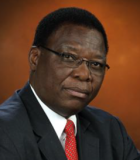 As the Executive Secretary of the African Academy of Languages (ACALAN), a specialised institution of the African Union, Sozinho Francisco Matsinhe is committed to the development of African languages. ACALAN aims to revolutionise current approaches, the strategies to be adopted and the ultimate goals and objectives to promote the use of African languages in all domains of society, particularly in education systems, in partnership with the former colonial languages. A keynote speaker at eLearning Africa 2014, Professor Matsinhe speaks to the News Service about how multilingualism can help reach education goals.
As the Executive Secretary of the African Academy of Languages (ACALAN), a specialised institution of the African Union, Sozinho Francisco Matsinhe is committed to the development of African languages. ACALAN aims to revolutionise current approaches, the strategies to be adopted and the ultimate goals and objectives to promote the use of African languages in all domains of society, particularly in education systems, in partnership with the former colonial languages. A keynote speaker at eLearning Africa 2014, Professor Matsinhe speaks to the News Service about how multilingualism can help reach education goals.
by Annika Burgess
What role do indigenous languages play in education, and in fostering sustainable development?
Let me start by recalling that the former colonial languages that have been retained as official languages in most member states of the African Union are not spoken by the vast majority of Africans, who speak African languages. So, in order to provide quality education to that vast majority, it is critical that indigenous languages are used as a medium of instruction in partnership with the former colonial languages. It is therefore clear that indigenous languages have a vital role to play in the provision of education in Africa.
As for the role of indigenous languages in fostering sustainable development, first of all, let us agree that, broadly speaking, development is the struggle by men and women to change their lives for the better. This implies constant interaction amongst human beings so that they share and record experiences and lessons. And that can only happened where there is effective communication; where there are no linguistic barriers! The indigenous languages can be effective in removing such barriers. Unfortunately, language has been quite absent in the development discourse because of the prevailing approach to development, which tends to trivialise it into economic growth. In order for sustainable development to take place in Africa we require linguistic equity that will see indigenous languages and former colonial languages being used in all domains of society.
What measures are being taken to reach your goal to promote functional multilingualism in the education sector?
ACALAN, as the specialised institution of the African Union entrusted with the task of developing indigenous languages and promoting their use in all domains of society in partnership with the former colonial languages I have mentioned, has been working with the member states of the African Union towards promoting functional multilingualism in the education sector. For instance, we are currently working on a programme for training the trainers of teachers of African languages in L1 methodologies; ACALAN is also working towards developing a methodological framework for developing terminology in African languages.
It is usually maintained that African Languages lack scientific and technical terminology and therefore cannot be used in education. In a very near future, ACALAN will hold a meeting of experts in terminology development. The experts will bring their experience in terminology development from various member states. Hopefully, at the end of the meeting we will have guidelines on how to produce terminology in African languages. As it is now, we seem to lack a common denominator in that regard.
We have also launched a peer-reviewed journal KUWALA, “light” in Chichewa, a Vehicular-Cross Border Language mainly spoken in Malawi, Mozambique and Zambia. KUWALA serves as a platform to debate and share experiences on language policies, including language policies in education across Africa and beyond. This will allow ACALAN to distil the best practices and replicate them. These are just some examples of what ACALAN has been doing to promote functional multilingualism in education.
How is eLearning being utilised?
eLearning has been used in various member states of the African Union. From ACALAN’s perspective, eLearning is part and parcel of ACALAN’s initiatives to accord an effective presence to African languages in the cyber space. It was in that context that ACALAN has produced a spell checker for Hausa, a Vehicular Cross-Border language mainly spoken in Niger and Nigeria.
Are you gaining the support you need at national level?
ACALAN, as I have already said, is an official institution of the African Union and there is no African Union without the member states. In a nutshell, yes we do receive the support we need at national level, despite challenges here and there! In fact, each member state of the African Union is expected to appoint a national institution dealing with language matters to serve as focal point of ACALAN. This is in accordance with ACALAN’s statutes. And most member states of the African Union have appointed focal points for ACALAN. We also get political will from the member states of the African Union, which is vital for the realisation of ACALAN’s mandate.
What do you hope to learn at eLearning Africa?
Localisation of eLearning content is vital in Africa, particularly because of the language issue I have already mentioned. Otherwise the computers that are an essential part of the learning process in eLearning will remain monsters threatening the vast majority of Africans with alien symbols displayed in strange tongues. So we hope to gain insights into the efforts to localise eLearning content in Africa and beyond.



















As a member of the SiSwati Language Board in Swaziland, this organization can teach us a lot on how to revitalise our local language